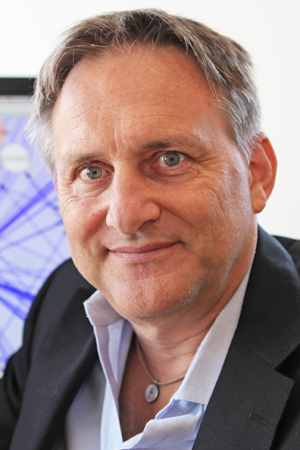News
Targeting Cancer and Careers: Precision Medicine

Andrea Califano, Dr
The migration away from “one-size-fits-all” medicine, particularly in the areas of cancer detection and treatment, holds great promise for patients and the field of precision medicine. Demand and jobs are increasing for researchers, clinicians and professionals who are at home collecting, analyzing and using more and newer forms of data, according to a recent feature reported in Science magazine which spotlights Dr. Andrea Califano , founding chair of the Department of Systems Biology .
In the field of oncology, innovations continue to grow rapidly in precision, or targeted medicine, as clinicians seek to find better treatments for specific kinds of cancer, rather than take a blanket approach via the traditional trifecta of radiation, chemotherapy, and surgery. To do so, they must test patients, note mutations, and identify biomarkers to determine what treatments could work best with the fewest side effects.
Scientific breakthroughs, in these areas and more, have led to greater understanding of genes and their functions and have created new opportunities for precision medicine—and for those with technical, research, and clinical skills eager to work in this ever-expanding field. Special consideration will be given to those job applicants who can perform big data analysis and multidisciplinary research. However, new jobs will also emerge in previously unseen areas, such as business, translational medicine, and genetic counseling.
New and powerful tools have aided the precision medicine movement. The Human Genome Project, the first complete mapping of human genes, published its preliminary results in 2001. The project’s numerous benefits include knowing the location of the approximately 20,500 genes identified in the body and gaining a clearer understanding of how genes areorganized and operate.
“The Genome Project has significantly improved our ability to learn how tumor cells work at the molecular level—the more we learn their inner workings, the better we’re able to develop effective therapies,” says Dr. Califano, who also is director of the JP Sulzberger Columbia Genome Center and associate director for bioinformatics of the Herbert Irving Comprehensive Cancer Center . “Right now, we know that using drugs targeting specific molecular dependencies of the cancer cell leads to significant increase in response. We expect that the future of medicine is going to be even more predictive, rather than being based on trial and error.”
Data analysts will be some of the most sought-after personnel, professionals agree, since the volume of information coming from multiple sources will continue to grow.
“There is going to be a tremendous requirement for analytical pipeline specialists—people who are able to perform sophisticated data analysis,” adds Dr. Califano. He also noted in the article, “We are in the infancy of precision medicine—we are setting the stage for what the future will be.”
Read the full article, "Targeting cancer and careers: Precision Medicine" , at Science .